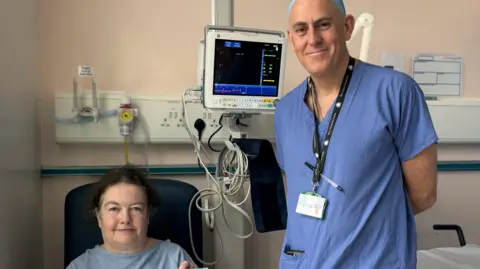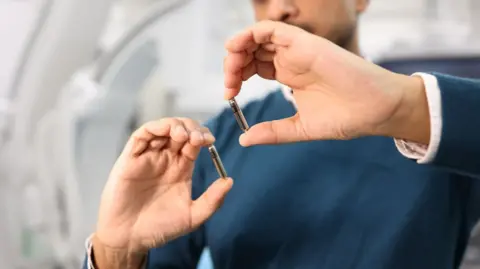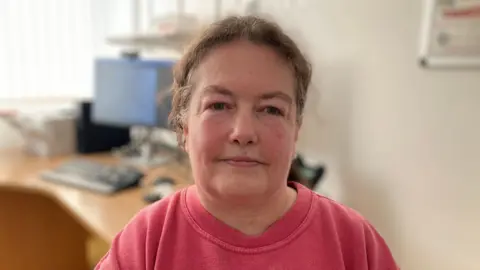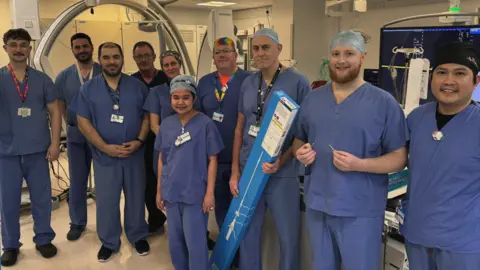Pioneering wireless pacemaker 'a game changer'
 University Hospital Southampton
University Hospital SouthamptonA Hampshire woman has become one of the first heart patients in the country to benefit from a pioneering wireless pacemaker system.
Doctors at University Hospital Southampton (UHS) said the technology was a "major leap forward" and would transform lives.
Traditional pacemakers are connected to the heart through wires, but the new devices can be implanted directly into two chambers of the heart, reducing the risk of complications.
Patient Karen Cooper said the dual leadless pacemaker technology was a "game changer".
 University Hospital Southampton
University Hospital SouthamptonDr John Paisey, a consultant cardiologist at UHS, led the team which carried out the keyhole surgical procedure.
He said the twin pill-shaped devices, which are each smaller than a triple-A battery, use revolutionary implant-to-implant technology.
"They talk to each other from different chambers of the heart to maintain the normal sequence of cardiac conduction, closer to a normal heartbeat," he said.

Pacemakers work by sending electrical impulses to the heart, stimulating it to beat at the correct speed.
Ms Cooper, 54, was fitted with her first pacemaker aged 17 after being diagnosed with an irregular rhythm of the heart.
The mother from Romsey has had seven wired pacemakers over the decades.
She said she was "running out of options" after a succession of infections and issues, including a blood clot in her neck.
System 'first of its kind in the world'
The dual wireless system, AVEIR DR, is the first of its kind in the world.
Southampton is one of the first hospitals in England to introduce the technology.
A specially designed flexible tube was used to implant the devices into the heart via a vein in the leg.
Dr Paisey said wired pacemakers had saved millions of lives and provided safe, effective treatment for most patients, but in a minority of cases alternatives were needed.
He said: “This new dual-chamber leadless pacemaker system can be a more effective solution for some patients, improving their quality of life and potentially reducing some of the risks associated with traditional pacemakers."
Previously only a single leadless pacemaker was available, which was not suitable for all patients.
 University Hospital Southampton
University Hospital SouthamptonDr Paisey said the new system was approximately 10 times more expensive than wired pacemakers and patients would be prioritised according to need.
Karen Cooper said she had felt well since the operation in early November.
She said: "It has made a very big difference. It's a game changer. I am not worrying about the wires or infections or anything. I can just get on with life."
You can follow BBC Hampshire & Isle of Wight on Facebook, X (Twitter), or Instagram.
